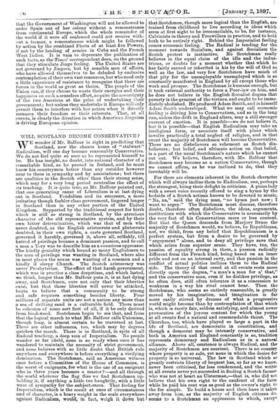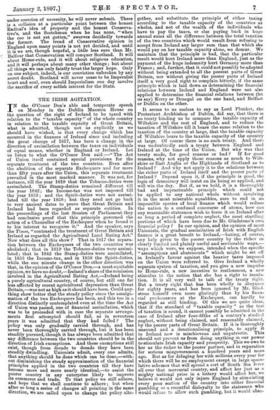WILL SCOTLAND BECOME CONSERVATIVE?
WE wonder if Mr. Balfour is right in predicting that Scotland, now the chosen home of " stalwart " Radicalism, will one day become reasonably Conservative. We do not feel quite so sure as he represented himself to be. He has insight, no doubt, into national character of a remarkable kind, as he proved in Ireland, and he must know his countrymen better than any outsider however near to them in sympathy and by associations ; but there are qualities in the Scotch other than their strong sense, which may for a very long period neutralise the effect of its teaching. It is quite true, as Mr. Balfour pointed out, that one generating cause of Liberalism is at last dying out in Scotland. Feudalism and its successor, a more irritating though feebler class government, lingered longer in Scotland than in any other portion of the United Kingdom. Supported by the traditional respect for birth which is still so strong in Scotland, by the atrocious character of the old representative system, and by their own bitter determination, which was that of men who never doubted, as the English aristocrats and plutocrats doubted, in their own rights, a caste governed Scotland, governed it harshly, governed it, above all, selfishly, till hatred of privilege became a dominant passion, and to call a man a Tory was to describe him as a conscious oppressor. The kindly geniality which bound so many Englishmen to the men of privilege was wanting in Scotland, where also in most places the nexus was wanting of a common and a kindly if sleepy Church. The Scotch aristocracy was never Presbyterian. The effect of that harsh government, which was in practice a class despotism, and which lasted, we think, longer than Mr. Balfour puts it, is at last dying away, and Scotchmen, sure not only that their liberties exist, but that those liberties will never be attacked, begin to believe that a community to be strong and safe requires something besides liberty. Four millions of separate units are not a nation any more than a sea of drifting sand is a culturable field. There must be cohesion of some sort first of all, if it be only derived from bind-weed. Scotchmen begin to see that, and from that the logical march to what Mr. Balfour calls Unionism, though long, is almost certain to be traversed at last. There are other influences, too, which may by degrees quicken the march. There is in Scotland, in spite of all Radical teaching, a deep vein of Imperialism. No people wander so far afield, none is so ready when once it has wandered to maintain the necessity of strict government, and none believes with so little doubt that British rule anywhere and everywhere is before everything a vivifying domination. The Scotchman, said an American witness once before a Committee of the House of Commons, is the worst of emigrants, for what is the use of an emigrant who in three years becomes a master ?—and all through tho world wherever the flag flies we find Scotchmen up- holding it, if anything a little too haughtily, with a little want of sympathy for the subject-races. That feeling for Imperialism, which is the result at once of circumstances and of character is a heavy weight in the scale everywhere against Radicalism, would, in fact, weigh it down but that Scotchmen, though more logical than the English, are trained from childhood to live according to ideas which seem at first sight to be irreconcilable, to be, for instance, Calvinists in theory and Freewillers in practice, and to hold both to be entirely right. Behind the Imperialist feeling comes economic feeling. The Radical is tending for the moment towards Socialism, and against Socialism the Scotch protest is instinctive. No Scotchman really believes in the equal claim of the idle and the indus- trious, or doubts for a moment whether that which he has fairly earned or inherited is his by the will of God as well as the law, and very few Scotchmen have much of that pity for the unemployable unemployed which is so constantly manifested in England by all except those who work and prosper. The Scotchman is humane enough, but it took external authority to force a Poor-law on him, and he does not believe in the English Socialist dogma that poverty is the greatest of the virtues, and ought to be imme- diately abolished. He produced Adam Smith, and is himself Adam Smith undeveloped. What we may call economic feeling is driving him to Conservatism, and so in the long run, unless the drift in England alters, may a still stronger current of emotion. It is possible—we do not believe it, but it is possible—that English Radicalism may take an irreligious form, or associate itself with plans which involve practically a total neglect of religion, and in that event the majority of Scotchmen will become Conservative. There are no disbelievers so vehement as Scotch dis- believers; but belief, and ultimate action on that belief, is a part of the usual Scotchman's nature which he cannot cut out. We believe, therefore, with Mr. Balfour that Scotchmen may become as a nation Conservative, though we cannot affirm, as he was inclined to do, that they inevitably will be.
For there are elements inherent in the Scotch character which will always incline them to Radicalism, one, perhaps the strongest, being their delight in criticism. A pious lady with a sweet voice recently offered to sing a hymn by the bedside of a Scotch artisan known to be devoted to music. "Na, na," said the dying man, "no hymn just now; I want to argey." The Scotchman must discuss, therefore doubt, therefore often disbelieve, the ideas, arguments, institutions with which the Conservative is necessarily by the very fact of his Conservatism more or less content. But that the Queen descends from Marjory Bruce the majority of Scotchmen would, we believe, be Republicans, not, we think, from any belief that Republicanism is a perfect system, but from a desire to be governed by " argeyment " alone, and to deny all privilege save that which arises from superior sense. They have, too, the passion of equality strong in them, a passion radically different from the French kind, being based on an inner pride and not on an internal envy, and this passion in the conflict of actual politics inclines them to the Radical side. The theory of that creed at all events rests more directly upon the dogma, "a man's a man for a' that," and the conservative man, even if he dislikes privilege, as he often does, still often tolerates it as a concession to weakness in a way his rival cannot bear. Then the Scotchman, who seems so entirely reasonable, is greatly moved by his imagination, and imagination is far more easily stirred by dreams of what a progressive world might become than by contemplation of that which is, which is rarely fair, seldom satisfying, and almost never provocative of the joyous content for which the young at all events feel a natural and commendable thirst. The Churches, too, which have played so large a part in the life of Scotland, are democratic in constitution, and though a democrat may be intensely conservative, and both in America and England constantly is so, tradition represents democracy and Radicalism as in a natural affiance. Above all, esurience is always Radical, and the majority of Scotchmen are estuient. There is no country where property is so safe, yet none in which the desire for property is so universal. The law in Scotland which so greatly restricts liberty of bequest has, so far as we know, never been criticised, far less condemned, and the writer at all events never yet succeeded in finding a Scotch farmer who was not at heart an Ulsterman,—that is, who did not believe that his own right to the usufruct of the farm while he paid his rent was as good as the owner's right to the fee simple. To build a house and then have it taken away from him, as the majority of English citizens do, seems to a Scotchman an oppression to which, except under coercion of necessity, he will never submit. There is a collision at a particular point between the honest Radical's idea of property and the honest Conserva- tive's, and the Scotchman when he has none, "when the coo is not yet gotten," swerves decidedly towards the former. The trend of Conservative opinion in England upon many points is not yet decided, and until it is we are, though hopeful, a little less sure than Mr. Balfour that Conservatism will conquer Scotland. It will about Home-rule, and it will about religious education, and it will perhaps about many other things ; but about all things we can only faintly trust the larger hope. Only on one subject, indeed, is our conviction unbroken by any secret doubt. Scotland will never cease to be Imperalist heart and soul, even should Imperialism one day involve the sacrifice of every selfish interest for the State.















































 Previous page
Previous page